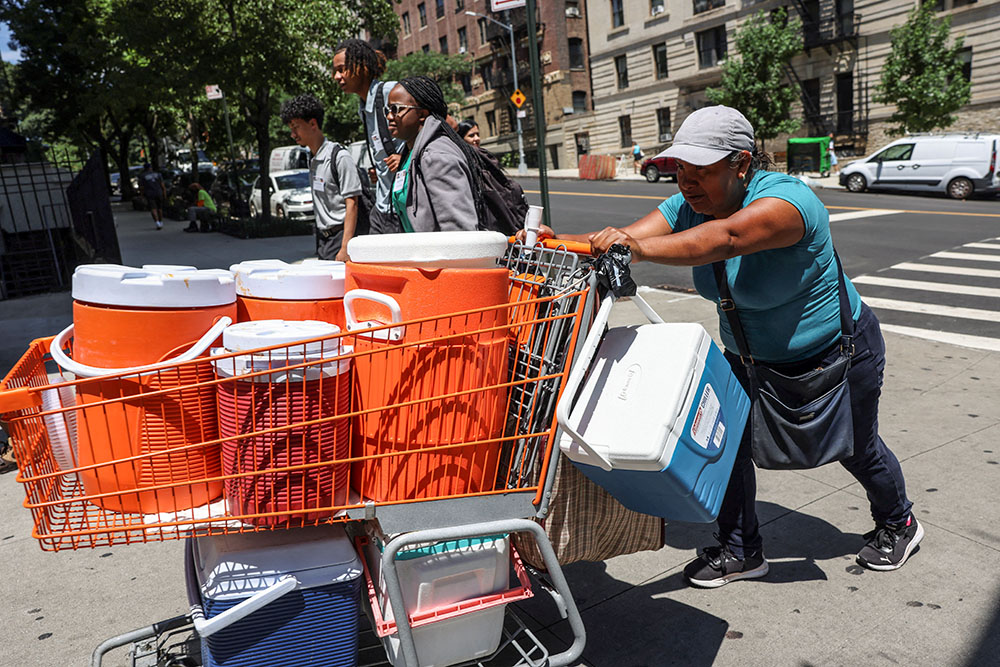
A woman pushes a shopping cart full of coolers and cold beverages during a summer heatwave in New York City July 11, 2024. Seventeen U.S. states set annual heat records in 2024, the hottest year to date. (OSV News/Reuters/Caitlin Ochs)
As a fusillade of executive orders continue to be inked by President Donald Trump, even the keenest of political observers might be forgiven for failing to keep up.
Indeed, the new president has signed more executive orders in his first 10 days — and first month — in office than any recent president in their first 100 days.
Not surprisingly, among the more than 70 executive orders are those related to the environment. Two of the most notable involve withdrawal from the Paris Agreement, a legally binding global treaty on climate change, and the freezing of "clean energy" project funds in the Biden-era Inflation Reduction Act of 2022, the nation's largest-ever federal climate change investment.
In 2015, the Pew Research Center reported that "roughly three-quarters of Catholics say that global warming is a problem, with about half saying it is a 'very' serious problem (48%) and a quarter saying it is 'somewhat' serious (26%)."
What, then, will Trump's executive orders mean for Catholics concerned with the climate?
"I do think the United States is losing credibility as a global leader in addressing one of humanity's greatest challenges, the ecological crisis," said Anna Johnson, North American senior programs manager for the Laudato Si' Movement, a global network of over 900 Catholic organizations and 10,000-plus trained grassroots leaders.
"Withdrawing from international agreements like the Paris Agreement sends the wrong message to the international community," Johnson added. "As Catholics, it's out of line with the call to care for our common home and for each other."
Pope Francis has made ecology a signature issue of his pontificate, penning Laudato Si', a 2015 encyclical, and Laudate Deum, a 2023 apostolic exhortation, to address it.
"Despite all attempts to deny, conceal, gloss over or relativize the issue, the signs of climate change are here and increasingly evident," asserted the pontiff in Laudate Deum.
"No one can ignore the fact that in recent years we have witnessed extreme weather phenomena, frequent periods of unusual heat, drought and other cries of protest on the part of the earth that are only a few palpable expressions of a silent disease that affects everyone," wrote Francis.
The U.N. has warned that "to limit global warming to 1.5 (degrees) C, greenhouse gas emissions must peak before 2025 at the latest and decline 43% by 2030." Failure to do so, it added, "risks unleashing far more severe climate change impacts, including more frequent and severe droughts, heatwaves and rainfall."
Since 2024 was the hottest year since records began in 1850 — and the planet's 10 warmest years since 1850 have all occurred in the past decade — ecological advocates are concerned.
But Trump has long been a climate change skeptic, telling a 2015 rally crowd, "It's a hoax. I mean, it's a money-making industry, okay? It's a hoax, a lot of it."
During Trump's first administration, more than 125 environmental rules and policies were rolled back.
In a 2024 interview with Elon Musk on the social media platform X, Trump opined that, "The biggest threat is not global warming, where the ocean is going to rise one-eighth of an inch over the next 400 years ... and you'll have more oceanfront property."
The Yale Program on Climate Communication at Yale University found in a post-election poll that a majority (73%) of registered voters support U.S. participation in the Paris Agreement, which was adopted at the U.N. Climate Change Conference (COP21) in 2015. Nearly 200 countries pledged to work together to limit global warming.
Yale's poll additionally found that 54% of registered voters think global warming should be a high or very high priority for the president and Congress, while 63% think developing sources of clean energy should be a high or very high priority.
Upon taking office, Trump declared an "energy emergency," which The Hill on Jan. 20 reported "his team has said would unlock additional powers to jump-start production" of energy. The president's favored refrain of "Drill, baby, drill" is focused upon fossil fuels — which release carbon dioxide (CO2) and other greenhouse gases into the atmosphere, trapping heat that contributes to global warming.
Advertisement
Still, with the White House regained, Trump wasted no time freezing clean energy funds in the Inflation Reduction Act, or IRA.
Included in the freeze are resources designated for home energy rebates; electric grid programs; hydrogen hubs (regional networks to produce, store and use hydrogen): battery manufacturing; the Industrial Demonstrations Program (designed to accelerate projects in energy-intensive industries); the Weatherization Assistance Program (meant to help low-income families permanently reduce energy bills by making households more energy efficient); and loan programs.
Critics have charged that suspending IRA funding will have nationwide clean energy repercussions.
"By stealing these funds and threatening to repeal the Inflation Reduction Act, President Trump and Elon Musk are jeopardizing those savings and could raise the national average annual house energy bills by up to 12%," said House Appropriations Committee Ranking Member Rosa DeLauro, D-Conn., in a Feb. 13 statement.
"These unlawful actions," DeLauro added, "also put at risk more than 350,000 jobs that support energy production across the country so our nation can become less reliant on foreign energy. Hardworking people are already living paycheck to paycheck."
Keneth Sercy, energy abundance policy manager at the Niskanen Center, a think tank in Washington, isn't immediately convinced that clean energy initiatives won't endure.
"Energy policy shifts at the federal level play an important role, but they're just one piece of a complex puzzle," Sercy told OSV News. "The U.S. energy landscape is shaped by market forces, state policies, court decisions and deeply entrenched infrastructure investments.
"The momentum toward cleaner, more diverse energy sources reflects decades of technological advancement and shifting economic realities," he explained.
Trump's decisions may slow — but not necessarily halt — an eventual clean energy transition, Sercy said.
"While the administration's actions can significantly affect the pace of this transition, several factors suggest continued clean energy growth," he observed. "The new Cabinet has emphasized grid modernization and an all-of-the-above energy approach, both of which enable clean energy expansion. Market drivers — including job creation, grid reliability and the strategic importance of AI leadership — continue to make clean energy supply growth attractive across the political spectrum," concluded Sercy.
Judge Glock —- director of research and a senior fellow at New York's Manhattan Institute think tank, as well as a contributing editor to City Journal — shared Sercy's caution.
"The estimates in some of the climate change results from the IRA is that we could reduce carbon emissions by, it was often said, 40% by the end of 2030," Glock explained. "If you look at those actual numbers, of course, that was 40% below 2005 levels, and that's thus continuing the trend that was already starting."
The IRA-funded projects are, Glock said, long-term; furthermore, state and local governments — as well as corporations — are poised to continue clean energy investments on their own.
"I think as many people pointed out, even the acceleration of the reduction in emissions that were speculated by the IRA, at least in the near term, was very unlikely," he said. "Precisely because these projects, even if everything goes to plan, will take years and years to actually stand up; to actually be connected to the general grid."
Anna Johnson, however, issued a caution that Trump's actions will carry a price.
"Our work around the environment is not simply environmental. It's a deeply moral and spiritual effort to protect those who are most vulnerable, and to grow the common good, and care for creation," said Johnson. "So all of this, it harms us not only ecologically — it also harms us in the eyes of the world and the international community."






